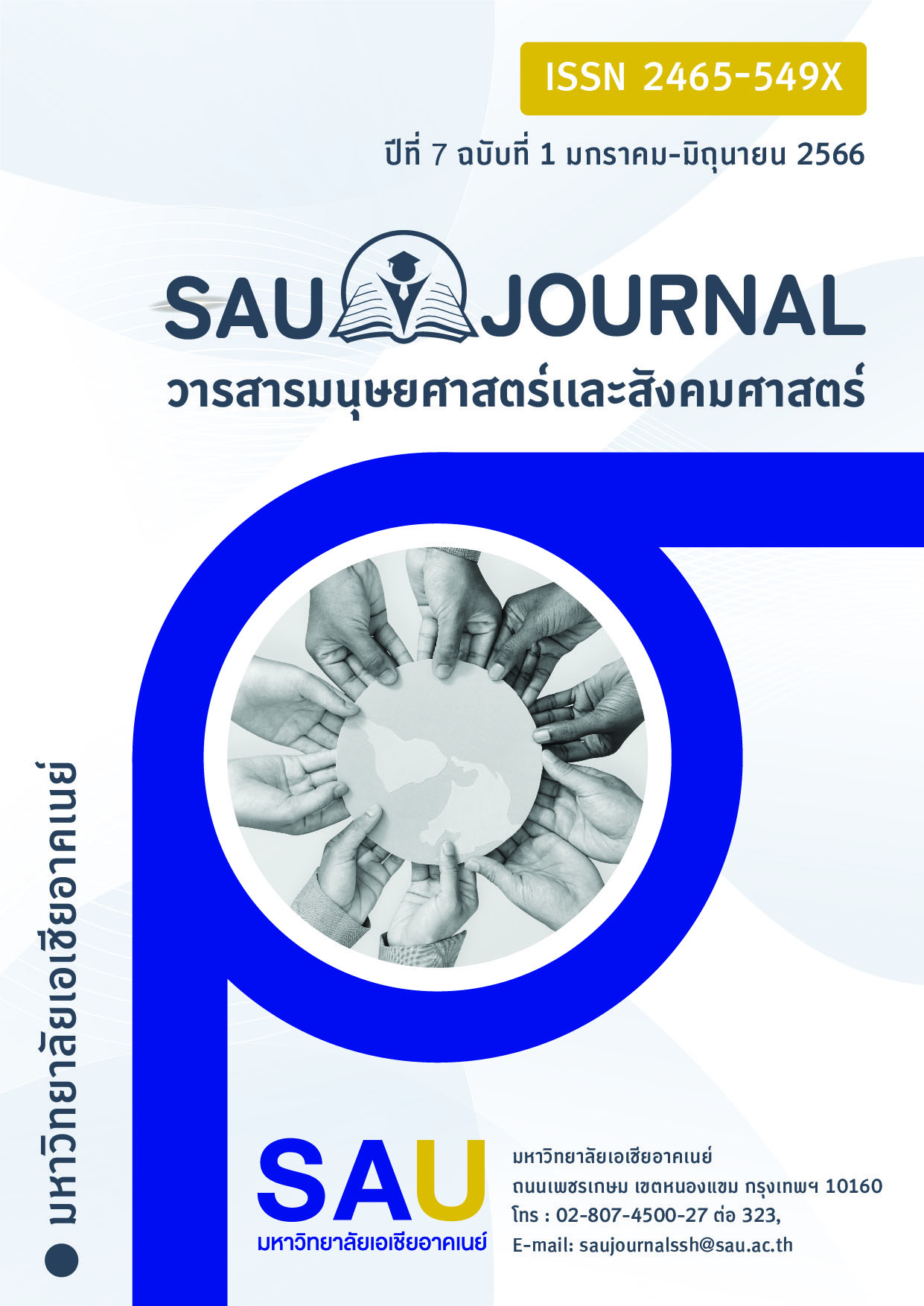The Effect of Meditation on Learning Performance: A Review
คำสำคัญ:
Meditation, Mindfulness, Learning Performanceบทคัดย่อ
This literature review aimed to compile empirical evidence of the effect of meditation on learning performance. Search strategies were conducted using online databases to identify published studies from 2012 to 2022, which are twenty articles that met the selection criteria. The review consisted of data extraction according to the data extraction form and analysis of articles by narrative synthesis to describe the meditation practice and their results in a learning context. Results revealed that meditation had been expressed as positively impacting learning achievement and cognitive skills while reducing anxiety and stress among those who practice. Moreover, the investigation guides further research in designing meditation practices to enhance the learning performance of learners.
เอกสารอ้างอิง
Aree, A., Surawattanaboon, C., Kaewprapha, P., Silawarawet, A. (2020). An Approach for Mental Preparation for First-Year College Students: A Case Study of Engineering Students. International STEM Education Conference, 161-164.
Ching, H. H., Malcolm, K., Tsai, T. H., & Chen, C. Y. (2015). Effects of a Mindfulness Meditation Course on Learning and Cognitive Performance among University Students in Taiwan. Evidence-Based Complementary and Alternative Medicine. 254358.
Fiebert, M., & Mead, T. (1981). Meditation and academic performance. Perceptual And Motor Skills, 53 (2), 447–450.
Foley, T., and Lanzillotta-Rangeley, J. (2021). Stress Reduction Through Mindfulness Meditation in Student Registered Nurse Anesthetists. AANA Journal, 89, 284-289.
Gupta, S. and Verma, H.V. (2020). Mindfulness, mindful consumption, and life satisfaction: An experiment with higher education students. Journal of Applied Research in Higher Education (JARHE), 12(3), 456-474.
Klatt, M., Harpster, K., Browne, E., White, S., & Case-Smith J. (2013). Feasibility and Preliminary Outcomes for Move-Into-Learning: An Arts-based Mindfulness Classroom Intervention. The Journal of Positive Psychology, 8(3), 233-241.
Kok, B. E., Waugh, C. E., & Fredrickson, B. L. (2013). Meditation and Health, The Search for Mechanisms of Action. Social and Personality Psychology Compas, 7(1), 27–39.
Koncz, A., Köteles, F., Demetrovics, Z., & Takacs, Z. K. (2021). Benefits of a Mindfulness-Based Intervention upon School Entry: A Pilot Study. Int. J. Environ. Res. Public Health, 18, 12630.
Lin, J. W., & Mai, L. J. (2018). Impact of Mindfulness Meditation Intervention on Academic Performance. Innovations in Education and Teaching International, 55(3), 366-375.
Mata, J. (2012). Meditation: Using it in the classroom. In W. van Moer, D. A. Çelik, & J. L. Hochheimer (Eds.), Spirituality in the 21st century: Journeys beyond entrenched boundaries, 109–119.
Morgan, W. J., & Katz, J. (2021). Mindfulness meditation and foreign language classroom anxiety: Findings from a randomized control trial. Foreign Language Annals, 54(2), 389-409.
Noble, H., Reid, J., Walsh, I. K., Ellison, S. E., & McVeigh, C. (2019). Evaluating mindfulness training for medical and PhD nursing students. British Journal of Nursing, 28(12), 798–802.
Pandya, S. P. (2020). Intergenerational Teaching-learning through Meditation and Smartphone Use Skill-knowledge Transfer between South Asian Grandparent-grandchild Dyads. Journal of Intergenerational Relationships, 1-24.
Pryjmachuk, S., & Richards, D.A., (2007). Predicting Stress in Pre-Registration Nursing Students. Br. J. Health Psychol, 12 (1), 125–144.
Rakowski, R. K., Johnson K. R., & Wojdynski, T. (2021). The impact of virtual reality meditation on college students’ exam performance. Smart Learning Environments, 8(21), 1-15.
Rao, A, R. (2017). A Novel STEAM Approach: Using Cinematic Meditation Exercises to Motivate Students and Predict Performance in An Engineering Class. 2017 IEEE Integrated STEM Conference (ISEC).
Rao, A. R. (2020). Interventions for Promoting Student Engagement and Predicting Performance in an Introductory Engineering Class. ADVANCES IN ENGINEERING EDUCATION, 8(2), 1-23.
Regina, K. R., Karen, R. J., Tomasz, W. (2021). The impact of virtual reality meditation
Riet, P. V. D., Rossiter, R., Kirby, D., Dluzewska, T., & Harmon, C. (2015). Piloting a Stress Management and Mindfulness Program for Undergraduate Nursing Students: Student Feedback and Lessons Learned. Nurse Education Today, 35(1), 44-49.
Sarangm, A., Kharatm, L., Talot. S., Joshi, S., & Chava, R. (2020). A study to Assess the Effectiveness of Mindful Meditation on Health and Academic Adjustment Problem Faced by Nursing Students in Selected Colleges of Pune City. Indian Journal of Forensic Medicine & Toxicology, 14(4), 3916-3920.
Saoji, A., Mohanty, S., & Vinchurkar, S. A. (2017). Effect of a Single Session of a Yogic Meditation Technique on Cognitive Performance in Medical Students: A Randomized Crossover Trial. J Relig Health, 56(1), 141-148.
Schwind, J. K., McCay, E., Beanlands, H., Martin, L. S., Martin, J., & Binder, M. (2017). Mindfulness Practice as a Teaching-learning Strategy in Higher Education: A Qualitative Exploratory Pilot Study. Nurse Education Today, 50, 92-96.
Spadaro, K. C., & Hunker, D. F. (2016). Exploring The Effects of An Online Asynchronous Mindfulness Meditation Intervention with Nursing Students on Stress, Mood, and Cognition: A Descriptive Study. Nurse Education Today, 39, 163-169.
Uopasai, S., Bunterm, T., Tang, K. N., & Saksangawong, C. (2022). The effect of meditation on metacognitive ability, working memory ability, academic achievement, and stress levels. Humanities, Arts and Social Sciences Studies, 22(1), 217-226.
Zeilhofer, L. (2020). Mindfulness in the foreign language classroom: Influence on academic achievement and awareness. Language Teaching Research, 27(1), 96-114.






